Jack Spicer’s J ran for eight issues: Nos. 1–5 were edited by Spicer in North Beach where contributions were left in a box marked “J” in The Place, a bar on Grant Avenue in San Francisco; Nos. 6 and 7 (an Apparition of the late J) were edited by George Stanley in San Francisco and New York City respectively while no. 8 was edited by Harold Dull in Rome. Spicer believed that poetry was for poets and the magazine had a small circulation but cast a long shadow. Contributors included: Robin Blaser, Richard Brautigan, Bruce Boyd, Kay Johnson, Robert Duncan, Joe Dunn, Ron Loewinsohn, Joanne Kyger, Helen Adam, and others. Covers (sometimes hand-embellished) were by Fran Herndon (Nos. 1, 2, 4, 5), Russell FitzGerald (No. 3), and George Stanley (Nos. 6, 7).
1. J, No. 1, edited by Jack Spicer
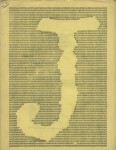 San Francisco: J, 1959
San Francisco: J, 1959
First edition, corner-stapled sheets in printed cover, 8.5″ x 11″, 38 pages, mimeograph printed. Cover by Fran Herndon.
- Contents:
- James Alexander – “The Jack Rabbit Poem”
Ebbe Borregaard – “Ballad for S A D”
Ebbe Borregaard – “Ballad of Billy Swan”
Robin Blaser – “Two Astronomers with Notebooks”
Jack Spicer – “Hokkus”
Joe Dunn – “Love”
Richard Brautigan – “The Fever Monument”
Sam the Tenor Man – “The Radio said Giants Cinch Loop Flag”
Bois Burk – “Ode to Pierre”
Bruce Boyd – “After Midnight”
Roland March – [untitled] “Mister Brustein…”
Damon Beard – [untitled] “Adverse repercussionless…”
Kay Johnson – [untitled] “My soul is the absurdity…”
Kay Johnson – [untitled] “The door in the dream…”
Robert Duncan – “Dream Data”
Sagen – “Dear Sprach” [pseuds. Borregaard and Spicer]
Harvey Harmon – “A Soldier and His Shadow”
Tony Richards – “Summer”
2. J, No. 2, edited by Jack Spicer
 San Francisco: J, 1959
San Francisco: J, 1959
First edition, corner-stapled sheets in printed cover, 8.5″ x 11″, 36 pages, mimeograph printed. Cover by Fran Herndon.
- Contents:
- George Stanley – “Tete Rouge”
Fran Herndon – untitled illustration
Jess Collins – “I Ups to My Self And”
Harvey Harmon – [untitled] “More paths…”
Jack Spicer – [untitled] “Down to new beaches…”
Robert Duncan – “Dear Carpenter”
Harvey Harmon – “A New Estate”
William Morris – “Dear Senior Poet”
Stan Persky – [untitled] “but it was a moment…”
Mary Murphy – “In-”
Will Holther – ” Lament for Otto de Fey”
Jack Spicer – “Epilog for Jim”
J.P. Shark – [untitled] “On account of changing tidal conditions…”
3. J, No. 3, edited by Jack Spicer
 San Francisco: J, 1959
San Francisco: J, 1959
First edition, corner-stapled sheets in printed and hand-painted cover, 8.5″ x 11″, 38 pages, mimeograph printed. Cover by Russell FitzGerald.
- Contents:
- Bruce Boyd – “Introduction”
Bruce Boyd – “Toward Morning”
Bruce Boyd – “War”
R.H. Blyth – “Letters to the Editor”
Rueban – “Q”
Mary Murphy – [untitled] “The skull is not the bones…”
Leo Krikorian – [untitled] “1. No drinking on duty…”
Ron Loewinsohn – “Entangling Alliances”
George Stanley – “Tete Rouge (continued)”
Jack Spicer – [untitled] “The slobby sea where you float…”
Damon Beard – [untitled] “Even —…”
Jack Spicer – “Last Hokku”
JBH [James Herndon?] – [untitled] “I don’t know how many…”
4. J, No. 4, edited by Jack Spicer
 San Francisco: J, 1959
San Francisco: J, 1959
First edition, corner-stapled sheets in printed and hand-painted cover, 8.5″ x 11″, 36 pages, mimeograph printed. Cover by Fran Herndon.
- Contents:
- Robert Duncan – “A Sequence of Poems…”
Richard Brautigan – “The Pumpkin Tide”
Richard Brautigan – “The Sidney Greenstreet Blues”
Richard Brautigan – “Surprise”
Garln – “Garln to His Friend”
Joanne Kyger – “Tapestry #3”
Josef Elias – “Joetry”
Donald Allen – “for Barbara”
John Ryan – “Pecadillo”
Jack Spicer – “Jacob”
George Stanley – “Tete Rouge (continued)”
Wallace Allen Healey – “Politics”
5. J, No. 5, edited by Jack Spicer
 San Francisco: J, 1959
San Francisco: J, 1959
First edition, corner-stapled sheets in printed and hand-painted cover, 8.5″ x 11″, 34 pages, mimeograph printed. Cover by Fran Herndon.
- Contents:
- L. Frank Baum – “from Sky Island”
Larry Eigner – “Front”
Jess Collins – “The Poets Corner” [comic strip]
Richard Brautigan – “1942”
Mary Murphy – [untitled] “Lack of oxygen…”
D.D. – “Fishing on Saturday”
Kay Johnson – “The Space is Too Wide”
Ron Loewinsohn – “WIBC Poems”
George Stanley – “Tete Rouge (continued)”
Robert Duncan – “The Song of the River to its Shores”
Richard Duerden – “Right Now”
Sheila Roche Harmon – [untitled] “A young devil sat…”
Jack Spicer – “Fifth Elegy”
William Berryman – “On the Composition of Bones”
William R. Allen – “Letter”
6. J, No. 6, edited by George Stanley
 San Francisco: J, 1959
San Francisco: J, 1959
First edition, corner-stapled sheets in printed cover, 8.5″ x 11″, 38 pages, mimeograph printed. Cover by George Stanley.
- Contents:
- Helen Adam – “Scenes from San Francisco’s Burning”
Paul Goodman – “I Love You, Necessary–”
Joanne Kyger – “Pan as the Son of Penelope”
Lucio Manisco – “Un Misto di Boheme Mistica e Letteraria”
William A. Berryman – [untitled] “in the after hours…”
7. J, No. 7, edited by George Stanley
 New York: J, 1960
New York: J, 1960
Corner-stapled sheets in printed cover, 8.5″ x 11″, 32 pages, mimeograph printed. Cover by George Stanley.
All contents are anonymous.
8. J, No. 8, 1961, edited by Harold Dull *
Rome: J, 1961
Contributors: Harold Dull, Stan Persky.
—
[*not in archive]
online excerpt from A Secret Location on the Lower East Side (Granary Books, 1998):
“In many ways the most beautiful of all the mimeo magazines, J had an eight-issue run. The first five issues were edited from North Beach bars by Jack Spicer with Fran Herndon as art editor. Spicer, who embodied the spirit of poetry in the Bay area, collected pieces for his magazine from a box marked “J” in The Place, a bar at 1546 Grant Avenue in San Francisco. A refugee from Los Angeles with two degrees from Berkeley, he had been a student of Josephine Miles there in the mid-1940s. They became close friends, and Spicer participated in the Friday afternoon poetry readings in Wheeler Hall during the late 1940s as well as the readings organized with Rockefeller money by Ruth Witt-Diamant at the new Poetry Center at San Francisco State. Into the cauldron of poetic politics surrounding Miles, Kenneth Rexroth, Robert Duncan, Lawrence Ferlinghetti, and others, Spicer introduced his freest of spirits, sometimes more Caliban than Ariel. Spicer lived for words (even making his living as a research assistant on a lexicographical project at Berkeley). He could be found most evenings in one of the North Beach bars or coffeehouses leading the discussion on poetry, poetics, myth, linguistics, and other mysteries. Like Blake and Yeats (with the help of Mrs. Yeats), Spicer attempted to clear his mind and open himself to “dictation” from other sources, which he devotedly pursued. Spicer also believed wholeheartedly in the necessity of human beings’ helping each other through communication, which he confronted in the editorship of J, a little newsletter of the poetic spirit. Donald Allen acted as J’s distributor in New York (“New York Contributions are not forbidden. But quotaed”), selling copies for Spicer to the Wilentz brothers of the Eighth Street Book Shop. In an early letter to Spicer, Allen eagerly wondered “what your editorial policy may be. Seduction by print.””
Further Reading:
Mimeo Mimeo on J



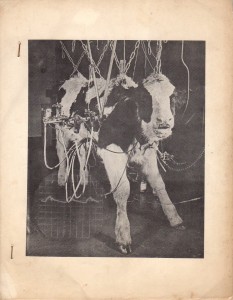
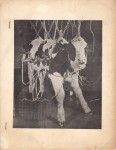

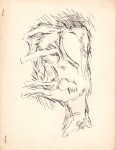











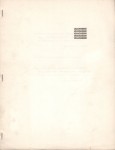
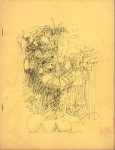
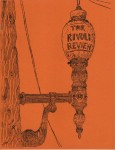
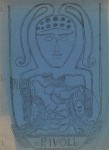
 home. While attending college at the University of California-Berkeley, Spicer met fellow poets Robin Blaser and Robert Duncan. The friendship among these three poets would develop into what they referred to as “The Berkeley Renaissance,” which would in turn become the
home. While attending college at the University of California-Berkeley, Spicer met fellow poets Robin Blaser and Robert Duncan. The friendship among these three poets would develop into what they referred to as “The Berkeley Renaissance,” which would in turn become the